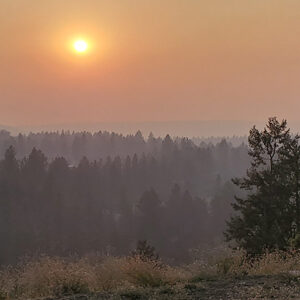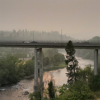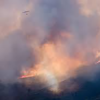
Wildfire smoke affecting air quality; could worsen as high atmospheric pressure starts building Saturday
Media Contacts
Lisa Woodard, Spokane Regional Clean Air Agency | (509) 863-2463 | LWoodard@SpokaneCleanAir.org
Kelli Hawkins, Spokane Regional Health District | (509) 994-8968 | khawkins@srhd.org
SPOKANE, Wash – Smoke drifting in from area wildfires is affecting air quality now and conditions could potentially worsen by Sunday afternoon, according to Spokane Regional Clean Air Agency (Spokane Clean Air).
As of midday today, the Air Quality Index (AQI) is in the Unhealthy for Sensitive Groups/Orange range and forecast to remain in that range through most of the day and tomorrow, before conditions may further deteriorate.
"On Saturday, high atmospheric pressure is expected to start building over the region, setting the stage for more smoke to accumulate. We are closely monitoring the situation and will update the air quality forecast as needed over the weekend," according to Mark Rowe, Air Quality Monitoring Manager for Spokane Clean Air.
"Given our proximity to some of the fires, any change in wind direction and/or fire activity could have significant impacts on air quality. So, it's important for individuals to monitor the AQI and to take the necessary steps to protect their health,” said Scott Windsor, Executive Director for Spokane Clean Air.
Dr. Francisco Velázquez, Health Officer for Spokane Regional Health District (SRHD) added, “Smoke can affect everyone. It’s important for all of us to prepare in order to reduce exposure. If you have outdoor events and activities planned for this weekend, please watch the air quality levels and keep the health of attendees and staff as top priority when making decisions."
SRHD provides a guide for School Activities and Outdoor Sporting Events to help navigate decisions based on air quality. The same guide could be used by businesses or for private gatherings. It is located at srhd.org/air-quality-wildfire-faq, under Resources.
Unhealthy for Sensitive Groups/Orange: Sensitive groups, defined below, should take steps to reduce their exposure: Limit time outside, avoid strenuous outdoor activity, and follow tips for cleaner indoor air (provided below). Everyone should watch for symptoms as a sign to reduce exposure.
Sensitive groups include people most likely to have health problems from breathing smoke, including:
- Persons with, or recovering from, COVID-19
- People with lung diseases (asthma, COPD, bronchitis, emphysema)
- People with respiratory infections
- People with existing heart or circulatory problems
- People with a prior history of heart attack or stroke
- Infants and children under 18.
- Older adults (over age 65)
- Pregnant women
- People who smoke
- People with diabetes
Symptoms of smoke exposure can be mild to severe, including coughing, scratchy throat, irritated sinuses, stinging eyes, and runny nose, shortness of breath, chest pain, and headaches. If you have heart or lung disease, smoke might make your symptoms worse. People who have heart disease might experience chest pain, a rapid or irregular heartbeat, shortness of breath, and fatigue.
If you have a pre-existing respiratory condition such as asthma, COPD (including chronic bronchitis and emphysema), or allergies, smoke may worsen symptoms (inability to breathe normally, cough with or without mucus, chest discomfort, wheezing, and shortness of breath). Seek medical attention when experiencing severe symptoms, such as chest pain or difficulty breathing. Dial 911 for emergency assistance if symptoms are serious.
Smoke and COVID symptoms: Some respiratory symptoms including cough, sore throat, and difficulty breathing are common to both wildfire smoke and to the COVID-19 virus.
Symptoms unique to COVID-19 include an increase in severity of cough, new loss of taste or smell,nausea or vomiting, diarrhea, fever. If you’re experiencing any of these symptoms, even those that seem minor, you should test for COVID-19. Free at-home tests can be ordered by visiting the testing section at covid.srhd.org.
Steps to reduce exposure to smoke:
- Limit duration and intensity of outside physical activity.
- Stay inside with cleaner indoor air
- Close windows and doors unless it is too hot to maintain safe temperatures.
- Don’t add to indoor air pollution, such as cigarette smoking or burning candles.
- Filter indoor air through an HVAC system, HEPA portable air cleaner, or DIY box fan filter.
- Set air conditioning to recirculate.
- If unable to maintain clean, cool air at home, seek shelter elsewhere.
- If you must be outside, wear a properly fitted, NIOSH-approved particulate respirator, such as an N95 mask.
For more information and resources on wildfire smoke and your health:
- Spokane Regional Health District Wildfire Smoke
- Spokane Regional Clean Air Agency Wildfire Smoke
- Statewide smoke and fire information
- L&I Wildfire Smoke Requirements & Policies


